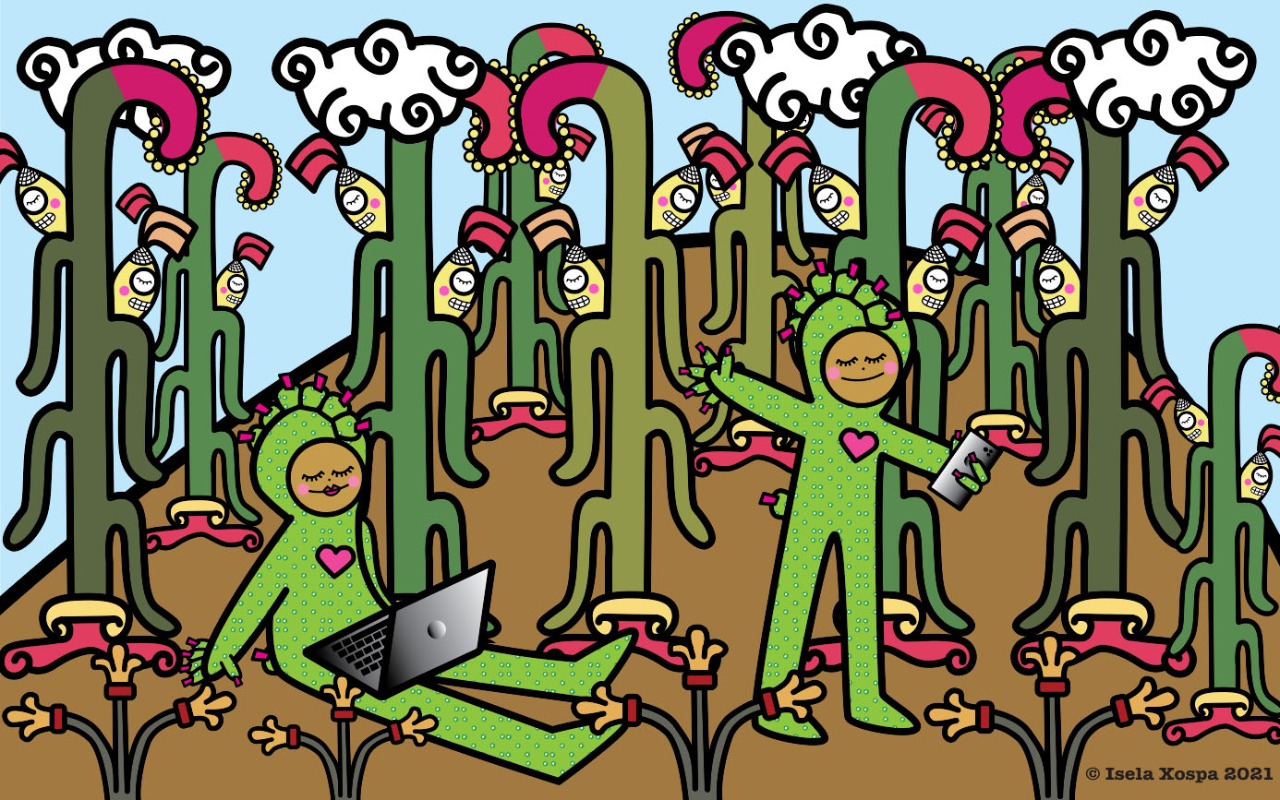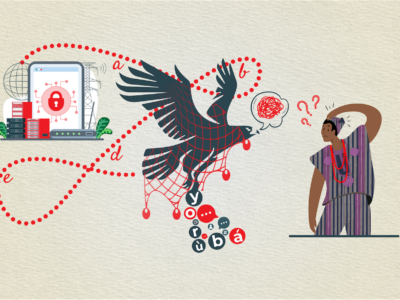
Illustration by Isela Xospa, under copyright and used by Global Voices with permission.
Rising Voices note: Our monthly newsletter provides a summary of our recent blog posts about all aspects of digital inclusion including access and adoption of digital tools, as well as different ways and opportunities for communities to fully participate online. Read here for previous editions of this newsletter.
Hello readers! We've been gone a while — sorry about that. We needed some time to think about what we want this newsletter to be, and we had other interesting stuff going on during our time away.
The pandemic and our shift to digital and virtual lives and work have had troubling consequences for many who were already stuck on the bad side of the digital divide. But the internet has also been a space of great creativity and rallying, with people fighting for their rights and claiming their space in the digital world.
MORE FROM THE RISING VOICES BLOG
While we’ve taken some time away, we haven’t stopped keeping up with great stories from around the world. In this comeback issue, we’d like to highlight for you just a few that were published during this hiatus.
First of all, indigenous content creators are striving not only to promote their native languages but to pass on the embedded cultural meanings to future generations:
→ Reviving the Cree and Ojibwe languages of Manitoba with TikTok
→ These African animators are saving their native languages using cartoons
In the same spirit, from Mexico to Australia, indigenous youth are talking about how their languages have been marginalized in a virtual world and practical strategies to take back the power of their languages. → From Mexico to Australia, Indigenous youth reimagine the internet for their languages
Meanwhile, queer people in Bolivia are taking to social media platforms, seeking to amplify their voices in creative ways and spark conversations for awareness. On the other hand, earth defenders are leveraging the power of digital tools to pool resources and support one another to advance their environmental campaigns.
AWARDS
COVID-19 has impacted our lives at many levels, education included. For public libraries striving to support education recovery via ICT technology during this pandemic, Electronic Information for Libraries wants to hear your stories! Please see here [es] [fr] [ru] for eligibility and application details to the 15th EIFL Innovation Award. Application due: November 8, 2021
UPCOMING EVENTS & CONFERENCES
As many are getting used to the “new normal,” leveraging the convenience that the internet provides, indigenous communities across Canada and the US are suffering more disenfranchisement from the digital divide than they did before. Do you want to join a virtual conversation about what can be done to change things? Consider registering for the ICS 2021. Date: October 12-15, 2021
TOOLS & RESOURCES
Interested in learning some Sm'algya̱x, a First Nations language indigenous to the Pacific Northwest Coast? Now you can join other learners here to hear how words are said and what they mean. Want more? You can find them on Youtube, too!
For those who work with endangered and/or minority languages, have you heard of Living Dictionaries, a mobile-friendly tool that can help you build a dictionary of your language? Living Tongues Institute for Endangered Languages has put together a list of free tutorials to get you started.
Looking to text in African vernaculars? Meet Bhala, an AI enabled mobile keyboard built for African languages, and hear what the Harvard researcher behind it has to say about the first tool of its kind.
MORE TO READ, WATCH and LISTEN TO
- Texting in Ancient Mayan Hieroglyphs
- Meet The Woman Who Created An App To Save Her Endangered Language
- Preserving the force of Navajo language
- How Minority Africa is using innovative storytelling for inclusion
- How storytellers in Uganda, Sierra Leone and Kenya are using mobile journalism to tell compelling stories
Subscribe to the Rising Voices Newsletter
Support our work
Since Rising Voices launched in 2007, we’ve supported nearly 100 underrepresented communities through training, mentoring, microgrants and connections with peer networks. Our support has helped these groups develop bottom-up approaches to using technology and the internet to meet their needs and enhance their lives.
Please consider making a donation to help us continue this work.



